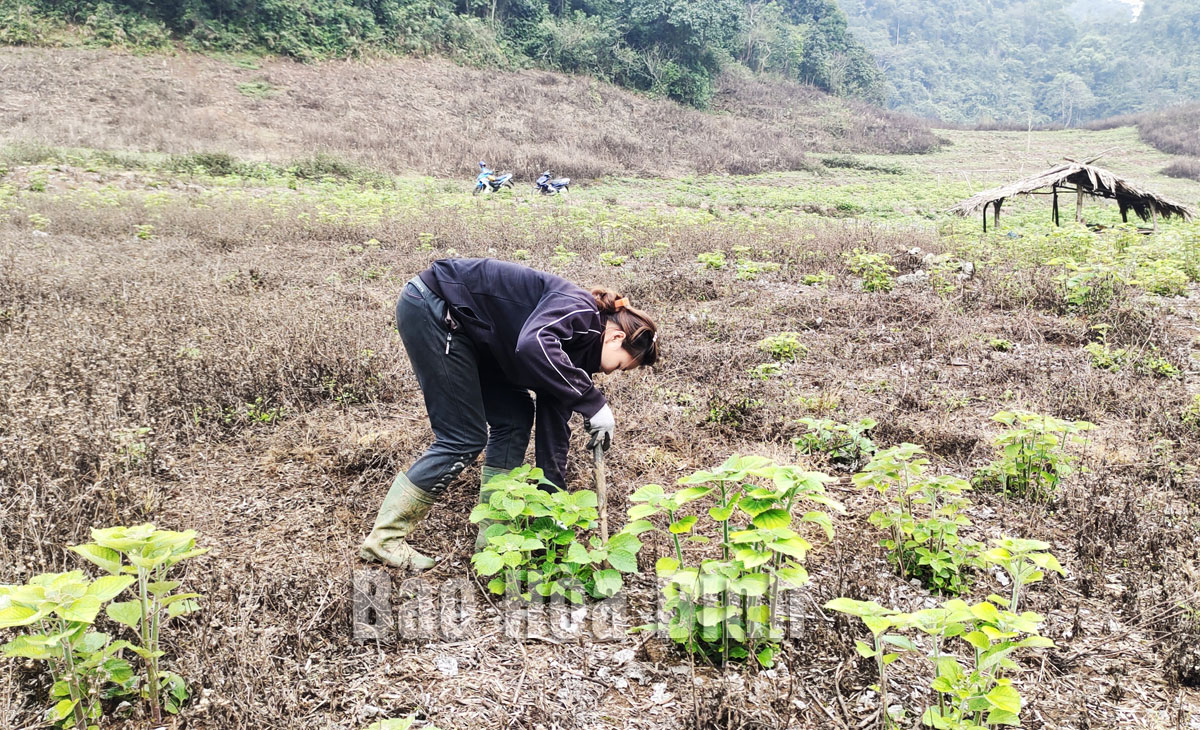
(HBO) - The national target programme on building new-style rural areas has created a facelift for Da Bac district. However, with a low starting point, the process of new-style rural area building in this mountainous district still faces a lot of difficulties.

A resident in Trung Thanh commune (Da Bac) farms ramie instead of maize and cassava for higher income.
Trung Thanh is one of the extremely difficult communes of Da Bac district. In recent years, through the new-style rural area building programme, this rural commune has been given a facelift. Local Party committee, authorities and people have exerted efforts to change the economic structure to increase income. In addition to afforestation, tea, corn and cassava, over the past two years, the commune has focused on planting ramie with an area of more than 50 hectares. By the end of 2022, the commune's per capita income reached 23 million VND (980 USD). However, the building of new-style rural areas in this commune still faces many difficulties. At the end of 2022, Trung Thanh was one of six communes in Da Bac district that had achieved 10 out of the 19 criteria.
With a low starting point, not only Trung Thanh but many other communes in the district have difficulties in this work, and traffic is a case in point as only six out of the 16 communes meet this criterion. There are five criteria that are more difficult than traffic, including cultural facilities, residential housing, income, poverty rate and health, with each criterion having only four communes meeting it.
In order to remove difficulties and accelerate the implementation of these criteria, Da Bac has taken a lot of solutions. Bui Khac Vinh, head of the district Office of Agriculture and Rural Development, said that right from the beginning of 2023, the district People's Committee has issued documents directing and guiding the implementation of the national target programme on building new-style rural areas to relevant agencies of the district and the People's Committees of communes, while continuing to promote dissemination and encourage locals to embellish the landscape and environment, and donate their land and property for the implementation of civil works.
Vinh stated that from now to the end of 2023, the district will strive to maintain the communes that have met new-style rural area building criteria, and have one reaching the advanced standards. The remaining communes each achieve one more criterion or more and maintain the achieved criteria. The average number of criteria reached in the district will be 14 per commune.
Da Bac will move to standardise and upgrade the rate of two provincial OCOP (one commune one product) products, continue to perfect and standardise rural infrastructure works in localities, and improve the quality of life of rural residents by creating production models associated with stable jobs for locals./.
Hoa Binh province is undergoing a dynamic transformation amid Vietnam’s national digital transition. Building on Poliburo’s Resolution No. 57-NQ/TW on breakthroughs in science, technology, innovation, and national digital transformation, the province has rolled out a wide range of practical action plans. A standout initiative is the "Digital Literacy for All” movement, an effort to ensure that no one is left behind in the digital era.
Hoa Binh province is undergoing a dynamic transformation in the wake of the national digital transformation movement. Building on Resolution No. 57-NQ/TW of the Politburo on breakthroughs in science, technology, innovation, and national digital transformation, the province has implemented a wide range of practical action plans. A standout initiative is the "Digital Literacy for All” movement ambitious effort to ensure that no one is left behind in the digital age.
With a spirit of unity and proactive problem-solving, the Party Committee, the government and the people of Dong Lai Commune (Tan Lac District) have made great strides in implementing the resolutions of the 24th Party Congress of the commune for the 2020 - 2025 term. Focusing on leadership and practical actions, the commune has brought the Party’s resolutions into daily life, creating strong impacts and pushing the local development forward.
Amid the nationwide push for digital transformation, young people in Hoa Binh Province are stepping up as dynamic pioneers, applying technology to enhance Youth Union operations and expand the reach of youth-led initiatives. Through creativity and adaptability, Youth Union organizations at all levels have introduced a series of practical solutions, contributing to modern governance and community development.
In recent years, An Nghia commune, located in Lac Son district, has stepped up administrative reform, focusing on improving the quality and efficiency of its single-window service unit for receiving and processing administrative procedures. These improvements have helped create favourable conditions for local residents and organisations to handle administrative procedures, contributing to the commune’s broader socio-economic development.
The Prime Minister-approved master plan to develop the multi-use value of forests ecosystems through 2030, with a vision to 2050, aims to improve the management and sustainable use of forest resources, create jobs, increase incomes, and improve the living standards of ethnic minorities, people in mountainous and remote areas, forest workers and those living near forests.



